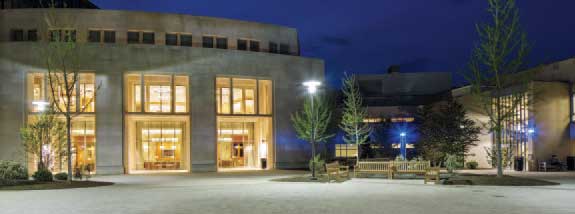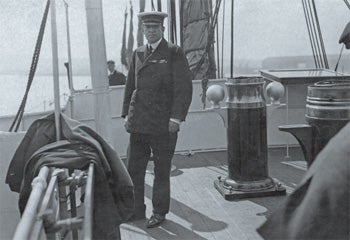Case in Point: The Lessons of Failure
Ernest Shackleton’s first journey to the Antarctic in the early 1900s ended in a very public failure. On his second journey, in a race to the South Pole, he turned back within 100 miles of his goal. In his third expedition, not only did he fail to traverse Antarctica, but his ship was destroyed by ice, stranding the crew on ice floes for more than a year. So why do law and business students and executives in legal and business organizations study Shackleton as an example of successful leadership?
“Shackleton’s experience teaches us about navigating through extreme turbulence and what teams can do to survive volatile, changing circumstances,” says Professor Ashish Nanda, who has taught Leadership in Law Firms to students at HLS, and led that course in the Executive Education program. He and other management scholars focus on Shackleton’s ability to bring his men through extreme deprivation with their health and morale intact.
Nanda uses his case study on the explorer’s third journey to prompt class discussions about effective leadership in the face of sudden change, and to draw lessons for leaders of today’s law firms and legal departments. In recent years, he says, some well-established firms have closed, in part because their leaders focused on short-term performance, failed to build resilient teams, and did not inspire confidence and loyalty in their partners and associates.
The case study, he says, allows students to ponder the meaning of success and leadership, whether on the high seas or in today’s business world.
Engaging With Democracy: A Lesson on Civics

Two people who served on the Supreme Court and two who have argued before it cited their own experiences championing civics education during an HLS panel discussion in the spring. Moderated by Dean Martha Minow, the event featured retired Supreme Court Justices Sandra Day O’Connor and David Souter ’66, Professor Laurence Tribe ’66, and former Solicitor General Kenneth Starr.
After she stepped down from the Court in 2006, O’Connor founded iCivics, a website offering materials on civics, to help “teach young people how our government works and how each of us is part of it,” she said. Souter noted the importance of history in civics education and the “value system” embodied by the Constitution. Starr pointed to his argument on behalf of the Flag Protection Act, which he said highlighted the importance of a “culture of liberty.” For Tribe, a First Amendment case he took based on a student’s observation of how a church was dictating a business’s practices offered “the unintended lesson that civic engagement matters.” Ultimately, the panelists agreed, civics education will help mitigate the cynicism many people feel about government.
Access to Justice: After Gideon
Fifty years after the Supreme Court determined in Gideon v. Wainwright that criminal defendants must be provided with counsel, scholars and practitioners from around the country grappled with continued limits on access to justice during an HLS conference in April titled “Toward a Civil Gideon: The Future of Legal Services.”
The keynote speech, given by Professor Gene Nichol of the University of North Carolina School of Law, explored how the Gideon case came about and what it has meant for access to justice. “Gideon sparks celebration, the way it should, but mainly it mocks us,” he said. “Between its marginalization on the criminal side and its brutal rejection on the civil side, it is at best the glass one-third full. And the two-thirds it leaves unsatisfied says more than any other stark reality about what sort of people we actually have become.”
The conference, which included HLS faculty and alumni, also considered the U.S. Supreme Court’s ruling in Turner v. Rogers, in which a narrow majority decided that civil litigants who face incarceration for contempt do not automatically have a right to counsel. Participants also explored the unmet needs of civil litigants, including in foreclosure cases. Another panel addressed the effectiveness of pro bono efforts, both in America and globally, as well as offering an analysis of legal aid cases. The conference also presented a panel on the future of legal services.
Dean Martha Minow, who serves on the board of directors of the Legal Services Corporation, noted in her opening remarks that connecting low-income people with legal assistance enables them to maintain their housing, jobs, family and physical safety. Yet Americans who can’t afford legal help routinely forfeit their basic rights, she said.
“And when people forfeit their rights simply due to absence of counsel, we all suffer,” said Minow.
100th anniversary: Celebrating A Century of Learning and Service
Since 1913, the Harvard Legal Aid Bureau has trained thousands of lawyers and provided free legal assistance to numerous low-income clients in the Greater Boston area. As the oldest student-run legal services organization in the country, the bureau has helped countless families and has been used as a model for other organizations. In November 2013, the bureau will mark its 100th anniversary. Hundreds of its alumni from all over the country will be returning to Cambridge on Nov. 8 to 10 for reunion events and panels celebrating “A Century of Learning and Service.”
Panels will cover topics ranging from trends in clinical legal education to serving low-income communities to alternative strategies for increasing access to justice. While ticketed events, such as the dinner and reception, will be reserved for bureau alumni, the entire Harvard community is welcome to attend the panels. For more information, email or go to the Harvard Legal Aid Bureau website.
Finishing Touches

A plaza now stretches between the renovated Pound Hall, Langdell, and the Wasserstein Hall, Caspersen Student Center, Clinical Wing Building. It’s a crossroads and an anchor—a gathering place at the heart of Harvard Law School.
